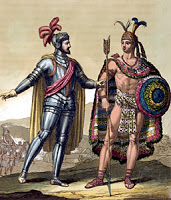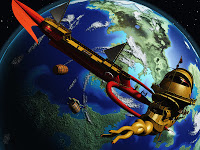“These days there seems to be nowhere left to explore, at least on the land area of the Earth. Victims of their very success, the explorers now pretty much stay home.”
– Carl Sagan, Pale Blue Dot
One of the great motivations in medieval European history was exploration. Driven by trade, the prospect of loot, and later aspirations to Empire, the notion of expanding the boundaries of what was the Known World to the scholars and rulers of Europe was a prime motivator for explorers, merchants, and conquistadors.
It is, unfortunately, a motivation quite unlikely to be present in a typical D&D milieu.
By definition, exploration involves discovering what was hitherto unknown. In a world where ethereal travel allows one to cross vast oceans without difficulty (aside from the occasional ether cyclone, of course), the prospect of outfitting a small fleet of ships to see what lies beyond the horizon seems wasteful.
In a world where spelljamming ships can view a planet from orbit, one can know with certainty that Maztica lies between Faerûn and Kara-Tur. Mistakes such as those of captain-general Cordell (and, for that matter, Christopher Columbus) become much less likely. Determining the source of great rivers such as the Nile becomes as simple as looking down over the rail.
In a world with flying mounts such as dragonnes, pegasi, hippogriffs, and griffons, as well as magical flight through rings, flying carpets, and fly spells, the prospect of impassable rivers, reef-protected islands, and inaccessible plateaus is removed. Just as the jungles of Brazil have opened up to modern technology, so too would the prospect of flight severely change the exploratory landscape. When a Princess Ark can cross a desert in days, there’s no need to take months in a caravan.
The motive of conquest and loot would still remain, of course, but the prospects for doing so successfully would increase dramatically, as intelligence, movement, and the prospect of reinforcement becomes as easy as if one had access to radios, satellite imagery, and helicopters. Trade would still take place using conventional means, but increased certainty of geography and what to expect on the journey would make the prospect somewhat less hazardous than was the case historically.
One would likely see more Pizarros and fewer Marco Polos.











I'm not so sure. Spelljammers and magical aids aren't always commonplace or necessarily trusted by non-magic-users, etc.
If such devices are overly common, then perhaps it would be so. Much like the spirit of exploration and travel in our own world is possibly diminishing due to the oversaturation of worldwide communication.
And so it goes.
I disagree.
http://www.jdh417.blogspot.com/2013/02/fantasy-pulp-fantasy-core-title-level.html